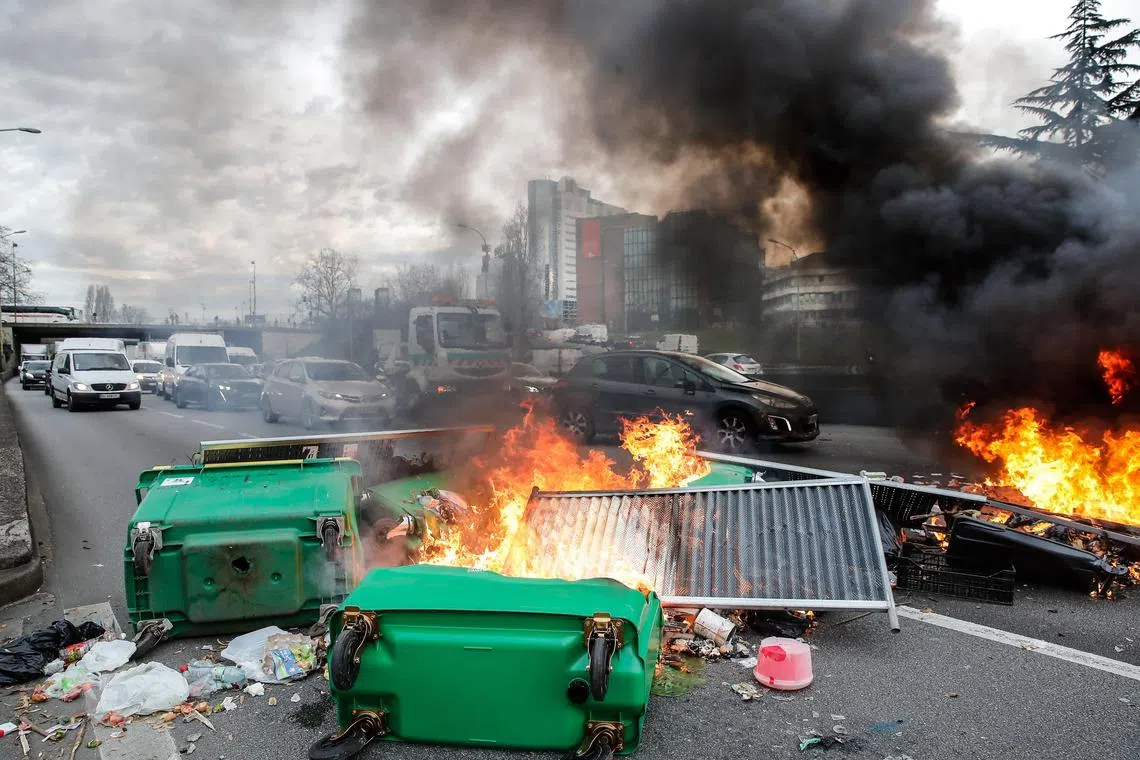Pressure mounts on French President Macron after violent unrest over pensions
Sign up now: Get ST's newsletters delivered to your inbox

Cars were torched in Paris and other French cities during spontaneous demonstrations involving several thousand people.
PHOTO: EPA-EFE
PARIS – French President Emmanuel Macron on Friday faced the gravest challenge to his authority since the so-called Yellow Vest protests after his government’s decision to push through a contested pension overhaul without a vote
Cars were torched in Paris and other French cities during spontaneous demonstrations involving several thousand people. Trade unions urged workers to step up strikes on Friday and briefly blocked the Paris ring road.
“Something fundamental happened, and that is that, immediately, spontaneous mobilisations took place throughout the country,” hard-left leader Jean-Luc Melenchon said. “It goes without saying that I encourage them, I think that’s where it’s happening.”
Interior Minister Gerald Darmanin said some 310 people had been arrested by police and he promised to crack down on troublemakers.
“Opposition is legitimate, protests are legitimate but causing mayhem is not,” he told RTL radio.
The unrest was reminiscent of the Yellow Vest protests which erupted in late 2018 over high fuel prices and forced Mr Macron into a partial U-turn on a carbon tax.
The pension overhaul raises France’s retirement age by two years to 64, which the government says is essential to ensure the system does not go bust.
Unions, and most French, disagree.
More than eight out of 10 people are unhappy with the government’s decision to skip a vote in Parliament, and 65 per cent want strikes and protests to continue, a Toluna Harris Interactive poll for RTL radio showed.
Going ahead without a vote “is a denial of democracy... a total denial of what has been happening in the streets for several weeks,” 52-year-old psychologist Nathalie Alquier said in Paris. “It’s just unbearable.”
A broad alliance of France’s main unions said they would continue their mobilisation to try and force a U-turn on the changes.
Protests took place in cities including Toulon on Friday, and more were planned for the weekend. A new day of nationwide industrial action is scheduled for March 23.
While eight days of nationwide protests since mid-January, and many more local industrial action, had so far been largely peaceful, the unrest overnight was reminiscent of the Yellow Vest protests which erupted in late 2018 over high fuel prices and forced Mr Macron into a partial U-turn on a carbon tax.
In Parliament, opposition lawmakers promised to file motions of no-confidence and called for Prime Minister Elisabeth Borne to resign.
However, there was little chance the fragmented opposition could unite to bring down the government. Conservative Les Republicains lawmakers have ruled out joining motions of no-confidence.
Votes in Parliament were likely to take place over the weekend or on March 20.
Labour Minister Olivier Dussopt told BFM TV that if those motions of no-confidence were rejected, the pensions overhaul bill would “be enacted”, downplaying the risk this could fuel further anger.
“I’m not in denial of the difficulties we are facing but, at a moment when things are moving, we must stay the course,” he added.
Trade unions have called for a new nationwide day of strikes and demonstrations on March 23.
Mr Macron will want to turn the page quickly, with government officials already preparing more socially minded reforms. He can also choose, at some point, to fire Prime Minister Borne, who has been at the forefront of the pension debate.
But either or both moves may do little to quell anger on the streets.
Amid the unrest on Thursday evening, someone had tagged on a shopfront: “Let’s destroy what destroys us.” REUTERS


